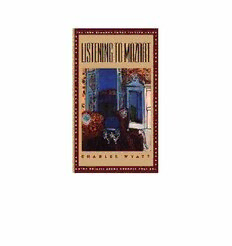
Listening to Mozart PDF
Preview Listening to Mozart
Page i Listening to Mozart Page ii The John Simmons Short Fiction Award Page iii Listening to Mozart Charles Wyatt University of Iowa Press Iowa City Page iv University of Iowa Press, Iowa City 52242 Copyright (c) 1995 by Charles Wyatt All rights reserved Printed in the United States of America No part of this book may be reproduced or used in any form or by any means, electronic or mechanical, including photocopying and recording, without permission in writing from the publisher. This is a work of fiction; any resemblance to actual events or persons is entirely coincidental. Printed on acidfree paper Library of Congress CataloginginPublication Data Wyatt, Charles, 1943 Listening to Mozart / Charles Wyatt. p. cm.—(The John Simmons short fiction award) ISBN 0877455244 1. Flute players—United States—Social life and customs— Fiction. 2. Manwoman relationships—United States— Fiction. I. Title. II. Series. PS3573.Y19L5 1995 813'.54—dc20 954777 CIP 01 00 99 98 97 96 95 C 5 4 3 2 1 Page v For Cindy With special thanks to Judith Grossman, Joan Silber, John Skoyles, and the Hambidge Center Page vii Contents Bach Suite 1 Half a Flute 11 LeopardSkin PillBox Hat 23 Enlightenment 38 The Bagpipe 56 Mrdangam 72 Teaching 85 Letters from J 99 Ghosts 109 Indonesia 119 Raag Yaman 134 Listening to Mozart 162 Page ix Acknowledgments Some of the stories in this collection appeared, in slightly different form, in the following publications: "LeopardSkin PillBox Hat," the Texas Review; "The Bagpipe," MidAmerican Review; ''Mrdangam," Quarterly West; "Teaching," Hanging Loose; "Ghosts,'' the South Carolina Review; "Indonesia," winner of the 1993 Chris O'Malley Prize in Fiction, the Madison Review. Page 1 Bach Suite My mind wanders dangerously when I play the flute. My thoughts float, dart, appear and disappear in mysterious cometlike ellipses. I hardly own them. When I was a child, I would construct elaborate fantasies as I practiced, and wake from them with no recollection of the scales I had played. I would imagine famous musicians standing outside my window, listening as I practiced, deeply moved by the music I had discovered among the tiny spiders clinging to the corners of my room; and if I had been foolish enough to have the radio on while I learned the notes of some difficult piece, I would have the precise, playbyplay recall of a ball game every time I played that particular passage. Later when I had my first job in an opera orchestra, I Page 2 was terrified of losing my place in the rests. Counting measures always put me into a trance of daydreaming, and I had to resort to counting on my fingers, something I still do today. When my mind slipped away, the fingers would continue to mark the measures, and sometimes I could recapture the number. It's an awful feeling, in an opera you don't know well, to have lost the count—waiting for your next entrance, usually a solo, wondering if you will recognize it, if the conductor will cue you beforehand, or if he will only glare wrathfully when it is too late. Before all this, when I was a child, I would fall asleep listening to music, and wake hearing music no man had written, and that would drain away from me far too quickly, like water from a leaping fish. I grieved its loss, and I sought out its source in every piece of music I learned. I never found it, but sometimes I felt near. And never so near as in the mystical constructions, the crystallike structures of J. S. Bach. Now, so many years later, I know from experience that this is one mystery I was not destined to penetrate, that all I can expect is to perform these great works, and endure the wanderings of my mind. And what do I think of? Of anything. When I am playing a solo, as I am tonight, I think of what I must do afterward, of bowing. Of whether I shake the conductor's hand first or the concertmaster's. Or I think of all the times I have played this piece, or, more likely yet, I think of the hours spent practicing, of waiting to perform it, of imagining its performance. Where does the music come from? I might as well be asleep, where perhaps I still hear those unearthly symphonies. One part of me minds the music; and that is not a conscious thing, rather a kind of falling, a slow falling, like a dive into green water with the surface almost out of sight. And the other part is wading in cattails with my rod held high, thick rubber boots over my knees, the smell of the mud just released in bubbles around me as I step and sink, and the sudden jar of the water moccasin striking my leg. Now I am standing in the wings, next to rows of stacked iron weights and cables stretching up into darkness, holding my flute in the most elegant way I can imagine, the way I hold it when I
